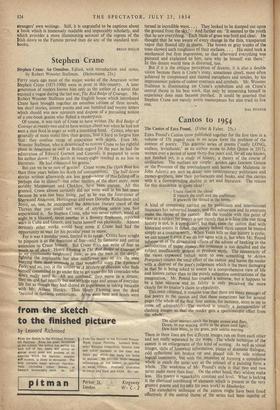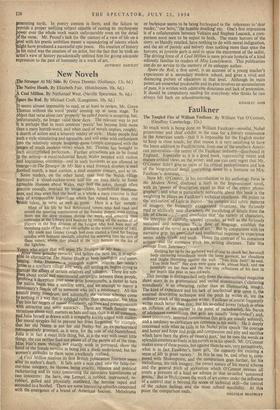Cantos to 1954
The Cantos of Ezra Pound. (Faber & Faber. 25s.)
EZRA Pound's Cantos (now published together for the first time in a volume of 576 pages) raise in an acute form the problem. of the content of poetry. This gigantic series of poems ('really LONG, endless, leviathanic,' as its author wrote to John Quinn in 1917), written over a period of some thirty-five years and, for all one knows, not finished yet, is a study of history, a theory of the course of civilisation. The outlines are simple: golden ages (ancient Greece or the Provence of the troubadours) and heroes (the Malatesta or John Adams) are seen to, decay into contemporary politicians and money-grabbers, into their parliaments and banks, and this carries with it a Corresponding decline in art and literature. The reason for this decaderice is quite clear: • Usura rustcth the chisel It rusteth the craft and the craftsman It gnaweth the thread in the loom.
A kind of conspiracy carried on by politicians and international financiers has subverted history, and this subversion and its contrasts make the theme of the cantos. But the trouble with this point of view as a subject for poetry is not merely that it is false (the one thing history is not, is a compiracy), but that, since the cantos deal with historical events in detail, the theory behind them cannot be treated simply as a creativessnyth. When Yeats tells us that history is cyclic, we can accept it even if we do not agree with it, but when Mr. Pound info:Koss-11S of the devastating effects of the advent of banking or the intrOduction of paper money, his treatment is too detailed and the subject insufficiently general to produce myth. The eccentricity of the views expsessed (which seem to owe something to Action Frangaise) vitiates the total effect of the cantos and leaves the reader with a distrust of the poet's judgement which is the more damaging in that he is being asked to assent to a comprehensive view of life and history rather than to the purely subjective constructions of the imagination. Mr. Pound has created a universe, but it happens to be a false universe and its falsity is only perceived the more clearly for its creator's claim to objectivity.
This once admitted, it remains true that there are many passages of fine poetry in the cantos and that these sometimes last for several pages (the whole of the first four cantos, for instance, seem to me to come off admirably). The method is usually ,a juxtaposition of clashing images so that the reader gets a spectroscopic effect from the whole:
The silver mirrors catch the bright stones and flare, Dawn, to our waking, drifts in the green cool light; Dew haze blurs, in the grass, pale ankles moving.
There in three lines are five cl:fferent images run on from each other and not really separated by the stops. The whole technique of the cantos is an enlargement of this kind of writing. As well as visual images, slabs of historical information, pieces of dramatic dialogue, odd reflections are broken up and placed side. by side without logical continuity, but with the intention of forming a cumulative whole in much the same way as the colours of a painting form a whole. The weakness of Mr. Pound's style is that two and two never make more than four. On the other hand, they seldom make less. His poetry is remarkably constant and level. What is lacking is the chemical combining of elements which is present in the very greatest poems and (to take his own work) in Mauberley. The cumulative technique of the cantos might have been fused effectively if the central theme of the series had been capable of leaerating myth. In poetry content is form, and the failure to 1 provide a proper unifying subject capable of casting its mythopeeic rower over the whole work reacts unfavourably even on the detail f the verse. Mr. Pound's lack (in the cantos) of a view of life on a 1 with his poetic ambition meant a squandering of talents which et have produced a successful epic poem. His creation of history s mind was the creation of an artist, but the fact that he took an .artist's view of history paradoxically unfitted him for giving adequate expression to the past of humanity in a work of art.
ANTHONY HARTLEY



































 Previous page
Previous page